|
London Road
Wrotham Heath
01732 884214
http://www.beefeater.co.uk/Royal-Oak-Wrotham-Heath.html
https://whatpub.com/royal-oak
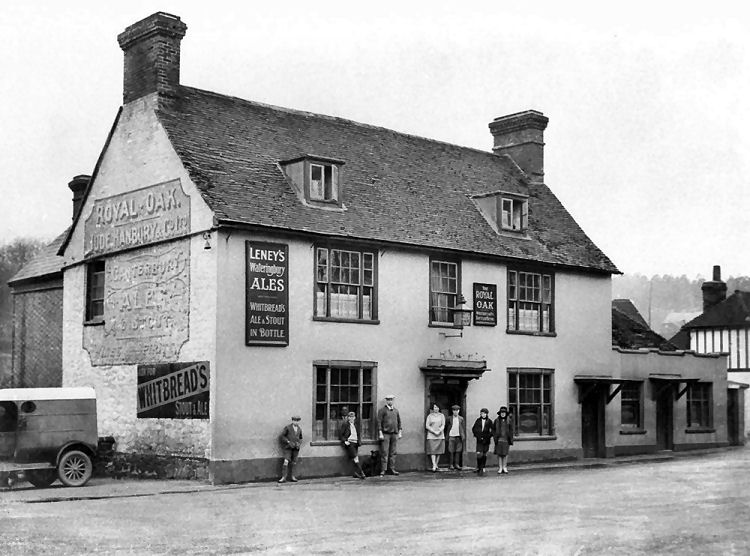
Above photo, 1925. |
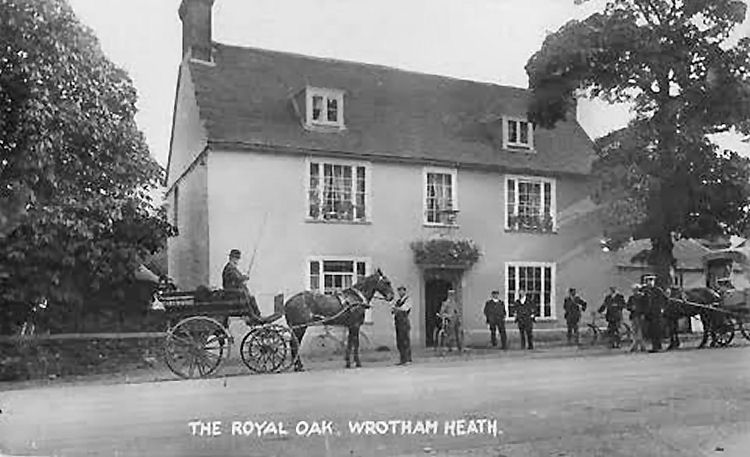
Above postcard, date unknown. |
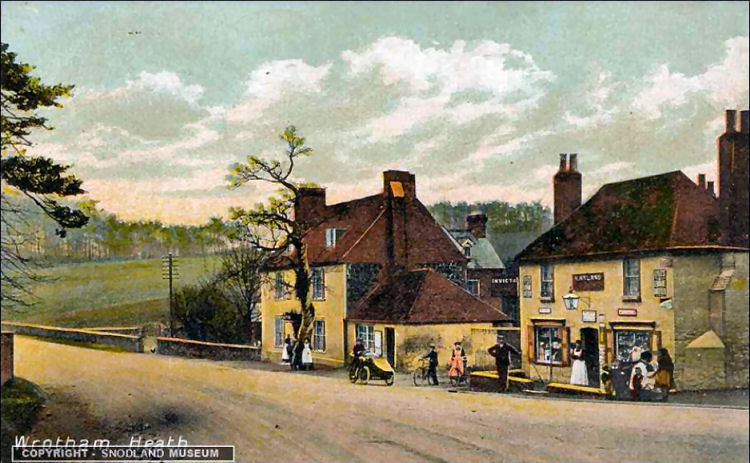
Above postcard, date unknown. Kind permission from Eric Hartland. |
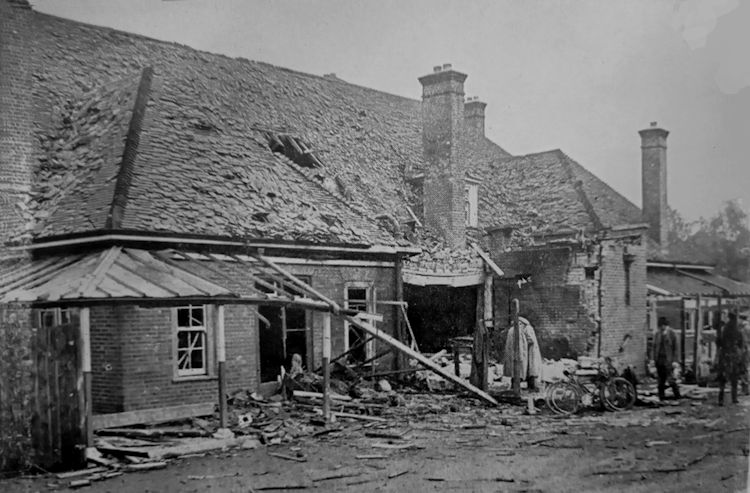
Above photo, 1940, kindly sent by Rory Kehoe. Royal Oak, A wartime
photograph of the pub showing the aftermath of a visit by the Luftwaffe
on Tuesday 15th October. At the time this photograph was taken, the pub
was a tied house within the estate of Frederick Leney's Phoenix Brewery,
Wateringbury. Leney's had been a subsidiary of Whitbread's since 1927.
Leney's would have been compensated by HM Government for war damage but
whether they repaired the old pub and later (post-war?) replaced it with
the current, roadhouse-style building, or finished the Luftwaffe's job
and built the enlarged pub during the war isn't known. |

Above photo, date circa late 1940s. |
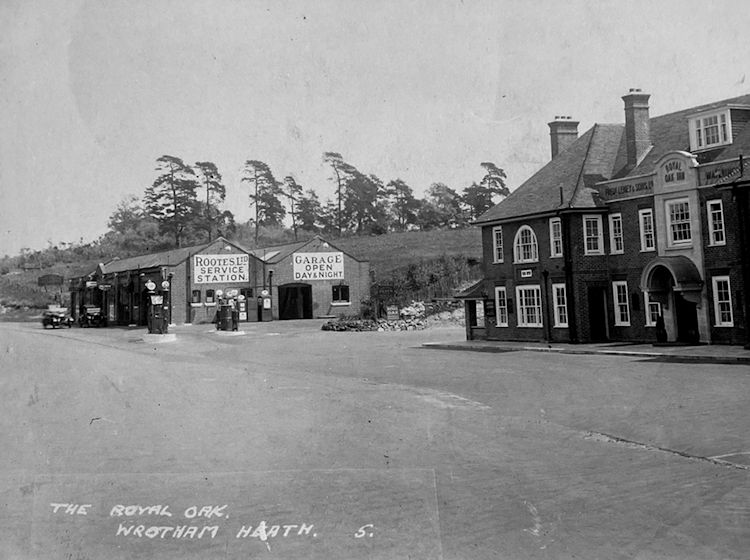
Above postcard, circa 1947, kindly sent by Rory Kehoe.
Having suffered serious bombing damage in 1940, the pre-war pub was,
at some point, levelled and replaced by a larger, roadhouse-style
building. Having been a subsidiary of Whitbread's since 1927, Frederick
Leney's Phoenix Brewery, Wateringbury, wouldn't have been short of funds
to pay for this upgrade. The pub's location, adjacent to the junction of
the A20 and A25, made it ideally situated to attract passing motor
trade. Next to the "Royal Oak" was a service station, owned by Rootes,
which by the late 1940s was a national brand. Not bad, considering that
the Rootes family had started up in Hawkhurst, as a small car sales
company, just before WW1. By the time Rootes was bought out by Chrysler
in 1970, Rootes had become a leading force in the British motor
industry, manufacturing such (then!) well-known marques as Sunbeam,
Talbot, Hillman and Humber, as well as Commer lorries. |
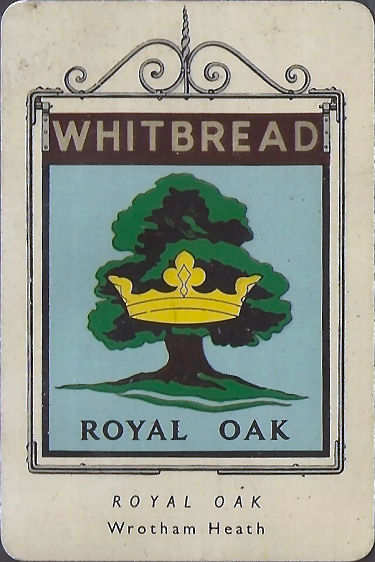 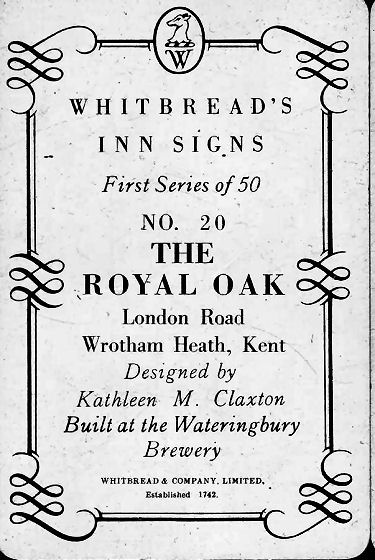
Above aluminium card issued May 1949. Sign series 1 number 20. |
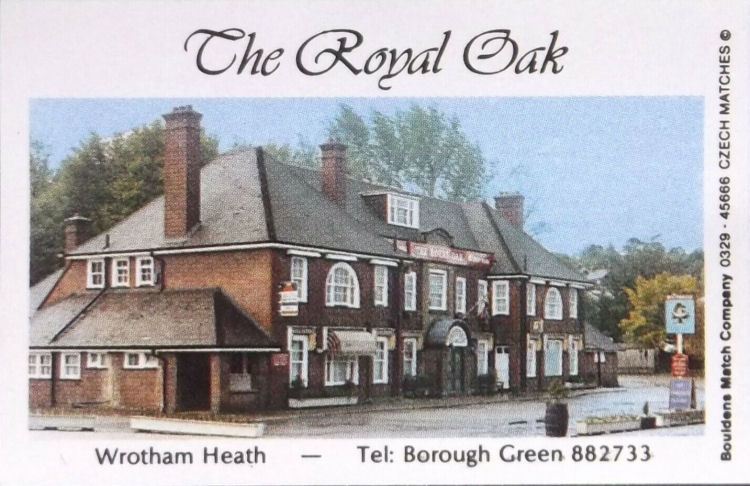
Above matchbox, circa 1980s, kindly sent by Debi Birkin. |
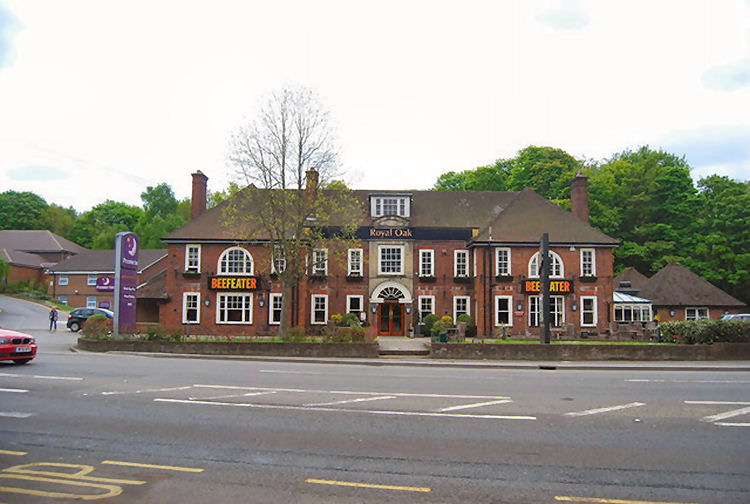
Above photo 2013 by N Chadwick
Creative Commons Licence. |

Above photo 2014. |
|
Kentish Gazette 23 October 1770.
Joseph Drywood, from Cranbrooke, Worsted and Yarn Maker, in
Mill-Lane, Maidstone. Advertising his products, also continues that he
delivers the Kentish Gazette every Tuesday & Saturday, setting out from
his house or the "Bull."
While delivering the papers he calls at the following named
Public-Houses, to collect parcels & orders.
The "Royal Oak" at Wrotham, ......
|
|
Kentish Gazette, 10 August, 1821.
DEATH.
July 29, at Wrotham, at an advanced age, Mr. Sheaf, formerly
landlord of the "Royal Oak Inn," Wrotham Heath.
|
|
From the Kentish Gazette, 12 May 1840.
DEATH.
May 1, of a decline, at the "Royal Oak Inn," Wrotham Heath, Mrs.
Butcher, wife of Mr. Butcher, landlord of the "King's
Head," Staplehurst.
|
|
South Eastern Gazette, Tuesday 8 June 1841.
On Monday the lodge house at Fatherwell, in Ryarsh, was entered in the
afternoon, and robbed of a pair of shoes, sheets, and other articles,
with which the burglar made off, although pursued to near the "Royal
Oak," Wrotham.
|
|
From the Kentish Gazette, 26 April 1842.
DEATH.
April 17, at Sombury, Middlesex, Mr. Thomas Kern, late of the "Royal
Oak," Wrotham Heath.
|
|
Maidstone Journal and Kentish Advertiser, Monday 19 September 1870.
The Charge of Stabbing.
Richard Baldwin, on remand, was brought up charged with stabbing Thomas
Bird at Wrotham. Mr. Norton appeared for the prisoner.
John Norley said he lived at Wrotham, on the 28th of August he was in
the "Royal Oak," and had several pints of beer with Thomas Bird. After a
while there arose a dispute between prosecutor and the prisoner. Norley
said he should start, and got up the road, when Bird called to him, and
he went back. He went back to the prosecutor, and they both went away
together. Baldwin followed after Bird, and asked him for money for a
pint of half and half. Bird said he did not owe money. Witness told him
to pay the money if he owed it. Bird gave Baldwin 3d., and Baldwin gave
him a half penny back. Baldwin turned to go when Bird says he should see
him another day. Baldwin came back and asked him what he meant by seeing
him another day, and they had some words.
A man name Wood came along the road, and they all sat down on the bank
together. Bird threaten to hit Baldwin, when witness pulled him away,
and he did so a second time. Witness again pulled him away, when Birds
threaten to hit him (witness). Norly went on his way home, and then she
was proceeding along the road, he saw a stranger, who asked him for a
match, and while in the act of turning round to give the man a match he
saw Bird strike Baldwin on the bank. They were sparring about in the
road. Baldwin then lifted his arm, when Bird fell down, and came towards
witness, and said prisoner and cut his arm.
Witness said he had better take him to his father, and went back with
Bird, and passed Baldwin and Wood. Witness said the prisoner "You have
struck that knife into him." Baldwin said he ran up against it. He took
her to his father's house.
Prisoner was discharged.
|
|
From the Kent and Sussex Courier, 10 July, 1914.
LICENSING.
The Bench approved the alterations to the "Royal Oak Inn," Wrotham
Heath. |
|
From
http://plattmemorialhall.org accessed 8 August 2018.
The Bombing of Wrotham Heath and the Royal Oak Pub.
The largest (and only) loss of civilian life in the parish occurred on
the night of 15 October 1940. Since early September, almost continuous
night bombing of London by the Luftwaffe had caused a colossal amount of
destruction in addition to killing and wounding thousands of ordinary
people. Often these night raids passed over Platt on their outward and
return journeys, and by mid-October the Germans had stepped up the
intensity of bombing, extending it to other cities around the country.
As the sun set on that fateful night in October, Londoners prepared for
another night of bombing, with spotters on roofs gazing into the
darkness for any sign of approaching aircraft, and wardens ready to head
out onto the streets to warn people that an attack was imminent. In
Wrotham Heath, the evening began just like any other in recent months,
with locals doing their best to retain some kind of normality, mindful
that an air raid warning could sound at any moment.
Mrs Walters who lived at the cottages adjoining the local cafe (now
Mings) had settled her children for the night in the front downstairs
room. Her husband, who was in the police war reserve, had just gone on
duty, and she had begun cleaning away the dishes from the evening meal.
Next door, Mrs Roberts, the proprietress of Roberts’ Tea Rooms had
closed up, and after a busy day, had taken a welcome seat in the
backroom behind her shop.
A number of locals had gone to the "Royal Oak" pub, where a darts match
commenced and others were seated about the bar area, indulging in a pint
and some good conversation. In the kitchen, Harriet Fread, the
eighty-year-old mother-in-law of Jack Swift, the licensee of the pub,
was busy making sandwiches with the kitchen maids Margaret Breeds and
Mary Ann Fisher.
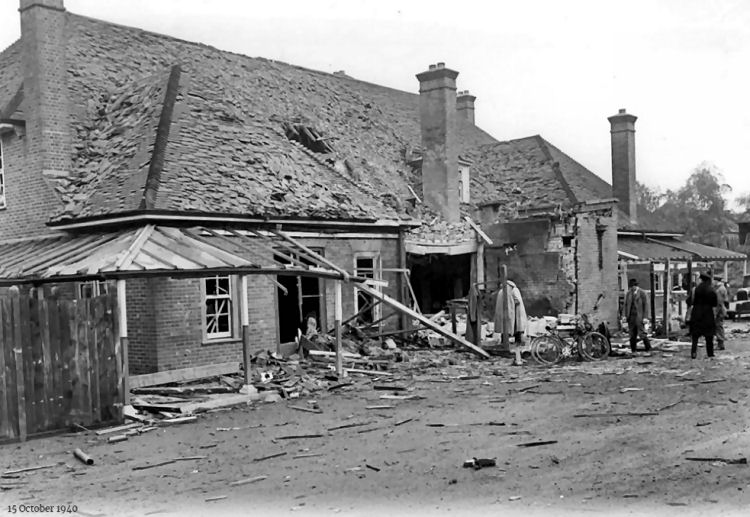
Perhaps residents of Platt parish heard the 410 enemy aircraft pass
overhead as they made their way towards the capital. And perhaps those
with wireless sets were listening as Bruce Belfrage read the 9 o’clock
news at the moment a German bomb hit Broadcasting House (Belfrage
continued despite being covered in debris and plaster.) What local
people were clearly not expecting occured half an hour later at
approximately 21:37, when a German raider returning from London, loosed
sixteen sticks of high explosives over Wrotham Heath. The attack came
without warning, and locals reportedly failed to hear the whistle of
descending bombs.
The first explosive scored a direct hit on the "Royal Oak" pub,
penetrating the kitchen and killing Harriet Freed and Margaret Breeds
(Mary Ann Fisher escaped with shock.) The blast tore through the
premises, devastating the bar and taking the lives of Frederick Walter
Heine, Edith Caroline Arragon and Frederick George Whiteman, who all
died whilst trapped under rubble. A number of others in the pub were
injured. William Bowen said he was in the saloon bar when the bomb fell,
and the customers were showered with glass and bomb splinters.
Walter F. Amies recounted:- "I was having a game of darts, he said, and my wife was sitting in a
chair nearby, she was blown backwards out of the chair, and when I
rushed to her I found that a piece of bomb splinter had entered her
knee. I pulled the splinter out and she was taken to hospital."
"Another girl had just got out of an armchair and a piece of bomb tore
right through the back of it. Had she sat in the chair a moment longer
she would have been killed."

"The friend I was with had just ordered some drinks and had got out his
wallet to pay when the bombs fell. There were flashes of blue light in
front of my eyes and the place seemed to be falling about me. I found
myself lying on the floor."
"None the worse, I picked myself up and saw a gas pipe blazing. There was
a man lying near the flames, and I pulled him to safety. My friend and I
had just got out of our car, which we parked outside the inn. The car
was wrecked."
"My wife, who was sitting in a chair near me, also escaped unhurt. This
is her second lucky escape, for a fortnight ago she was blown through a
hedge without being hurt."
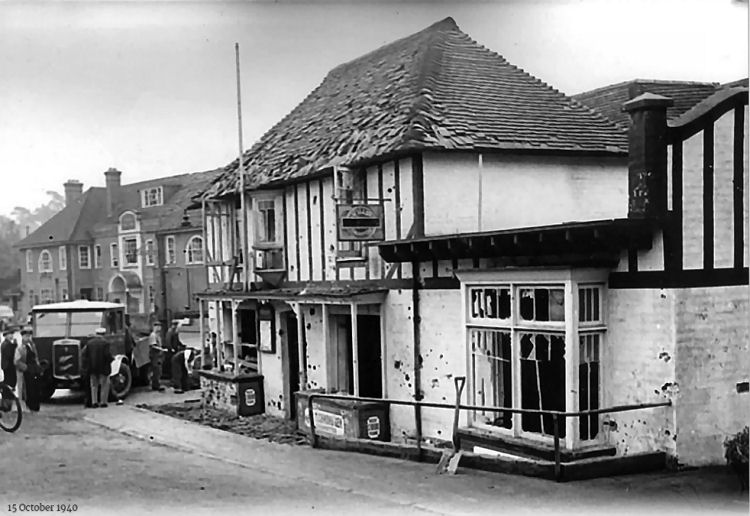
As the bombs fell, Mrs Roberts found herself being blown across the room
against the wall and suffered from shock The heat from a gas pipe, which
had ignited outside, melted the sweets in her shop."
Next-door bomb splinters smashed plates just in front of the face of Mrs
Walters, who said:-
"Glass flew into the rooms, ceilings came down and the place filled with
dust and fumes,” she said. “I thought my children must have been killed.
Two big pieces of bomb splinter went through the bars of the cot in
which my youngest child, little Colin, was sleeping. The splinters made
holes in the wall and must have passed within inches of the child, but
he lay there unhurt."
"The other two children, Brenda and Brian, were sleeping in another bed
and they were smothered with glass and debris from the ceiling, but they
too were unhurt."
Several bombs fell on and near Wrotham Heath House, causing a great deal
of damage and further loss of life. Doors and windows were shattered and
the interior of the property wrecked. Hester Muriel McInnes, who lived
nearby at Huntsman’s Lodge and was visiting her mother, was killed
sitting in an armchair in front of the fire, whilst Charles Rootsey,
Thomas Clayson died under rubble in an adjoining property known as
Rhette.
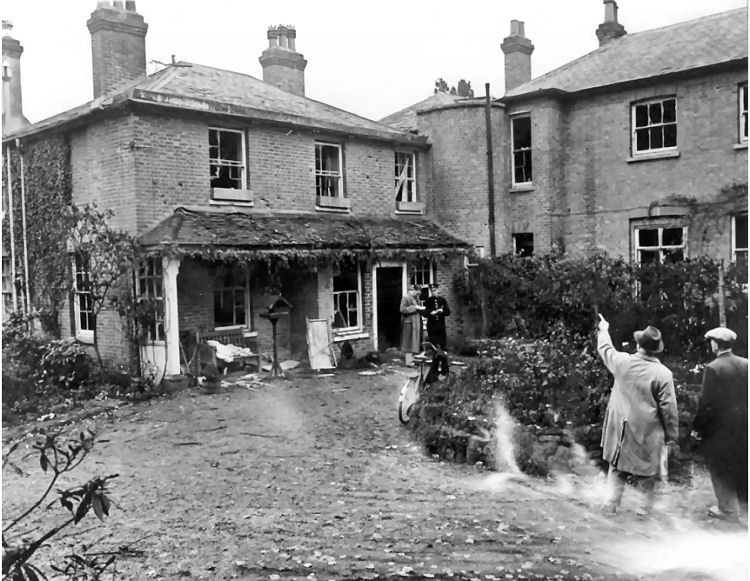
A number of other houses along the Sevenoaks Road were affected by the
blasts, and several bombs straddled across the highway damaging Rootes
filling station, which was next to the pub.
The Kent Messenger reported:- "The service station which adjoins the "Royal Oak" suffered extensive
damage, windows and doors being smashed. There was also slight damage to
the roof, the oil dispensers and petrol pumps."
"Fortunately the station was closed at the time and there was practically
no one about. There is an electric clock outside. The hands on the clock
face nearest the inn stopped at the exact time the bomb fell, but the
hands on the other side still continued to register the correct time."
The seriously injured were taken to Preston Hall Emergency Hospital in
Aylesford, where the following individuals later died: Harriet Fread,
Harry Harvey, Margaret Olive Hodgson and Alfred Edward Palmer.
Incredibly the clearing up process began shortly after the last of the
wounded were taken away, and the pub was even able to open for business
the following day. Mr. and Mrs. Swift were both uninjured, although
shaken, and everyone was high in their praise of the calmness and pluck
with which they faced the situation. “They were wonderful," said one of
the customers. “Mr. Swift had the presence of mind to turn off the gas
and electricity and do everything he could in the circumstances.”
In total eleven local people lost their lives as a result of the raid.
In London it had been the worst toll since the opening days of the
blitz. As dawn broke on the 16th four hundred were dead, and over nine
hundred were wounded.
By the end of the month air raids in Platt had all but petered out, and
life began to temporarily return to a form of normality. |
LICENSEE LIST
SHEAF Mr 29/July/1821 dec'd
KERN William 1828+

KERN Thomas 1832-17/Apr/42 dec'd (age 48 in 1841 ) )
 
HOLLANDS William 1847+
USHER Thomas Edward 1851-71+ (age 51 in 1871 ) )
STILES Thomas 1881-1903+ (age 46 in 1881 ) )

POLLICOTT Charles (manager) 1903

USHER Thomas 1891 (age 71 in 1881 ) )
SWIFT John Samuel 1913-39+ (also small holder age 69 in 1939)
https://pubwiki.co.uk/RoyalOak.shtml
 From the Pigot's Directory 1828-29 From the Pigot's Directory 1828-29
 From
the Pigot's Directory 1832-33-34 From
the Pigot's Directory 1832-33-34
 From the Pigot's Directory 1840 From the Pigot's Directory 1840
 From the Kelly's Directory 1903 From the Kelly's Directory 1903
|














